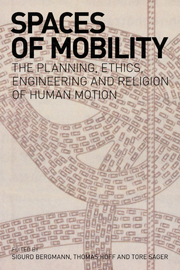Book contents
- Frontmatter
- Contents
- List of illustrations and tables
- Contributors
- Preface
- Acknowledgements
- 1 The beauty of speed or the cross of mobility? Introductory reflections on the aesth/ethics of space, justice and motion
- Part I
- 2 Hypermobility and the forecast-free planning of society
- 3 ‘Green’ attitudes and sustainable household consumption of energy and transport: six conditions that improve attitude–behaviour consistency
- 4 Travelling as pilgrimage: ecotheological contributions to mobility ethics
- Part II
- Part III
- Index
4 - Travelling as pilgrimage: ecotheological contributions to mobility ethics
from Part I
- Frontmatter
- Contents
- List of illustrations and tables
- Contributors
- Preface
- Acknowledgements
- 1 The beauty of speed or the cross of mobility? Introductory reflections on the aesth/ethics of space, justice and motion
- Part I
- 2 Hypermobility and the forecast-free planning of society
- 3 ‘Green’ attitudes and sustainable household consumption of energy and transport: six conditions that improve attitude–behaviour consistency
- 4 Travelling as pilgrimage: ecotheological contributions to mobility ethics
- Part II
- Part III
- Index
Summary
Since the 1960s, it has become increasingly apparent that the mobility of modern societies has serious environmental effects. Recently, for instance, car traffic has been recognized as one of the main contributors to global warming. The planning of mobility gives rise to difficult moral problems concerning the relationship between today's individuals and groups, current and future generations and humans and other life forms. To date, rather little has been said about these issues from a religious and ethical perspective. It is the last of the conflicts, the conflict between humans and other life forms, that is the least acknowledged in the public debate and that I shall therefore focus on in this paper (of course, this does not mean that I do not regard the other two forms of conflicts as important). Here I would like to outline the contributions that Christian ecotheology can make to an ethics of mobility. I concentrate on Christian theology since Christianity is still the dominant religious tradition in the Western world, and therefore most relevant in this context. I think that such a discussion is of interest above and beyond a theological viewpoint, because it problematizes underlying assumptions about space and nature in the context of the larger public debate about transportation. This is especially true because these assumptions partly have their historic origin in certain interpretations of Christian theology, which have been challenged by contemporary ecotheology.
- Type
- Chapter
- Information
- Spaces of MobilityThe Planning, Ethics, Engineering and Religion of Human Motion, pp. 81 - 100Publisher: Acumen PublishingPrint publication year: 2008

